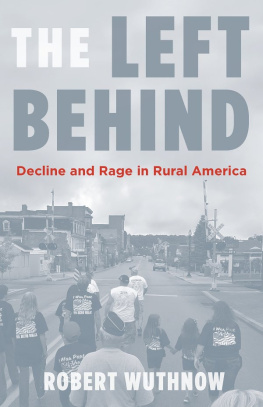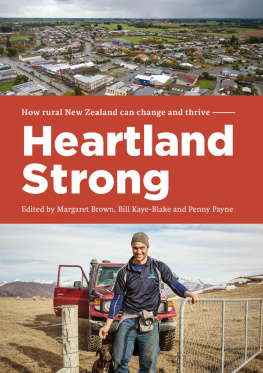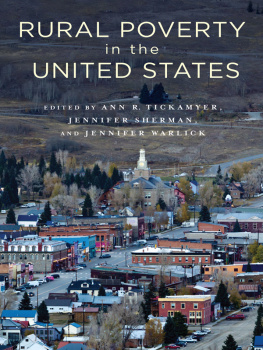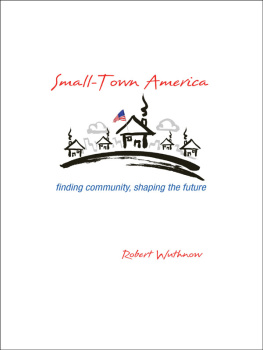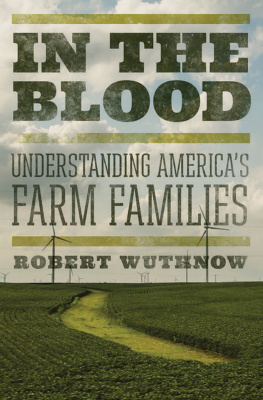THE LEFT BEHIND
THE LEFT
BEHIND
Decline and Rage in Rural America
ROBERT WUTHNOW
Princeton University Press
Princeton & Oxford
Copyright 2018 by Princeton University Press
Published by Princeton University Press,
41 William Street, Princeton, New Jersey 08540
In the United Kingdom: Princeton University Press,
6 Oxford Street, Woodstock, Oxfordshire OX20 1TR
press.princeton.edu
Jacket photograph courtesy of PA Hero Walk
All Rights Reserved
ISBN 978-0-691-17766-3
British Library Cataloging-in-Publication Data is available
This book has been composed in Baskerville 120 Pro and Gotham
Printed on acid-free paper.
Printed in the United States of America
10 9 8 7 6 5 4 3 2 1
CONTENTS
THE LEFT BEHIND
Introduction
When the dust settled following the bitterly contentious 2016 presidential campaign, analysts scrambled to make sense of the results. One of the clearest conclusions was that rural communities voted overwhelmingly for the Republican candidate. Hardly anyone credited the rural vote with having decided the election. But the differences between rural and urban or suburban results were
The leading explanation for the growing rural-urban political divide was that rural people wanted change because they were suffering economically. A related explanation attributed the rural vote to its predominantly white population being racist and misogynist enough, particularly if resentment was involved, to prefer a white male candidate. Both explanations
Pundits suggested that the grievance-and-resentment arguments probably had merit, yet
Kentuckian Dee Davis of the Center for Rural Strategies thought, too, that Trumps victory had more to do with culture than policy. A lot of us in rural areas, our ears are tuned to intonation, he said. We think people are talking down to us. What ends up happening is that we dont focus on the policywe
It certainly seemed plausible that the rural-urban divide was cultural. For more than a century, New York Times editorials had vacillated between romanticized essays about the rustic life and caustic criticisms of backward voters in rural areas
But To find out what people in these communities thinkwhat their lives are like, what they value, and how they arrive at their opinions about political candidates and governmentwouldnt it make sense to spend time talking with them?
Ive spent the past decade studying and writing about rural America. Its a world I grew
My argument is that understanding rural America requires seeing the places in which its residents live as moral communities. I do not
A moral community draws our attention to the fact that people interact with one another and form loyalties to one another and to the places in which their interaction takes place. These enduring interactions and the obligations and identities they entail constitute the community as a home. Understanding communities this way differs from the notion that people are independent individuals who form their opinions based strictly on their economic interests and their psychological needs. They may be rugged individualists. But they are not fundamentally that. Spend some time in rural America and you realize one thing: people there are community-oriented.
Contrary to the view that gained popularity during the 2016 presidential campaign, rural America is not a homogeneous census bloc. Nor is it a uniform polling category or even a one-party political constituency. To be sure, rural America is politically more conservative than urban America. But that fact has led to as much misunderstanding as it has up-close analysis. Arlie Russell Hochschilds Strangers in Their Own Land: Anger and Mourning on the American Right, for instance, is an insightful study of the resentment that led the people she studied in the Lake Charles Metropolitan Statistical Area in Louisiana, a population of more than 200,000, to support the Tea Party. But it is not a study of rural America.
Rural America is composed of small communities. Rural Americans live either in small towns or near them. Drive in nearly any direction from any city and these are the communities that dot the landscape. Of the 19,000 incorporated places in the United States, 18,000 of them have populations less than 25,000. And of these 18,000, 14,000 are located outside of an urbanized area. This is rural America.
Towns are the centerpiece of rural America. As colonists populated the Eastern Seaboard, they settled in towns. And as the population expanded along the open frontier, it established towns. Whether settlers lived in them or farmed in their vicinity, towns were essential to their survival, so essential in fact that even as the nations population relocated to cities and suburbs, the towns place in rural Americas imagination held firm.
Thorstein Veblen many years ago captured the towns meaning
Nearly a century later, few of those who live in cities and suburbs would think about it the way Veblen did. But many who live in country towns would. Rural Americans realize the nation and the culture have moved on. And yet they believe that the heart of America still beats in small communities.
Talking to rural Americans, you learn quickly how deeply their identity is rooted in their town. Its population may be declining, but they care about its survival. It is where they know peopletheir neighbors, the mayor, the woman at the bank, the man at the farmers co-op. Maybe they grew up here. Maybe they own land. They care if the home team has a winning football season. They take pride in their community spirit.
You may not like everything about your townthere may be a lot you dont like. And yet the town is a big part of who you are. It is where you live, where you know people, and where people know you. Its values rest on your shoulders and its ways of thinking inflect your conversations. It is your way of life. You value it and you try to protect it.
The moral outrage of rural America is a mixture of fear and anger. The fear is that small-town ways of life are disappearing. The anger is that they are under siege. The outrage cannot be understood apart from the loyalties that rural Americans feel toward their communities. It stems from the fact that the social expectations, relationships, and obligations that constitute the moral communities they take for granted and in which they live are year by year being fundamentally fractured.
The fracturing is evident in the fact that many rural communities are declining in population. Schools are closing, businesses are leaving, and jobs are disappearing. It is evident in families raising children who they know will live elsewhere and in parents commuting farther to work, shop, or worship.
These alone, however, are not the reason for thinking that moral outrage is rooted in the sense that moral communities are under siege. The farm population and the population of many small towns have been declining for a century. Rural families have not only anticipated its inevitability but also encouraged their children to seek better jobs elsewhere for generations. When a moral order begins to crumble, the implications run wider and deeper. Its slide diminishes trust while bolstering protective energies. Asking How can the problems be solved? leads to questions about who is to blame.
Understanding the cultural dynamics presently at work in rural communities requires starting with the local norms, expectations, and habits that persons living in these communities take for granted most of the time but can readily articulate when asked to say what their communities are like. Rural communities viewed through the lens of people who live there differ from one place to the next depending on population size, history, region, and the local economy. However, there are also commonalities, including what residents laud as the desirable aspects of their communities. It matters to them that they feel safe and can enjoy the relative simplicity of small-town life. They take pride in their communities achievements, if only something as locally significant as a new fire truck or a winning basketball team. They recognize the disadvantages of living where they do, and yet they weigh these disadvantages against the obligations they feel to their children, perhaps to aging parents, and to themselves.
Next page
